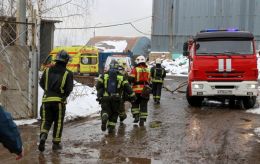North Korean missiles used by Russia to attack Ukraine have US and European-made circuits, CNN reports
 Photo: fragments of the North Korean missile that the Russian Federation used to hit Kharkiv on January 2 (khar.gp.gov.ua)
Photo: fragments of the North Korean missile that the Russian Federation used to hit Kharkiv on January 2 (khar.gp.gov.ua)
An analysis of fragments from North Korean missiles used by Russian occupiers to strike Ukraine shows that they contain a significant number of Western-made components. These parts were produced in the USA and European countries, informs CNN.
Russia's strikes on Ukraine with North Korean missiles
A representative of the Ministry of Defence of Ukraine stated that since the beginning of 2024, Russia has launched around 60 North Korean KN-23 missiles at Ukrainian territory.
According to estimates by Western media, this accounts for nearly one-third of the total 194 ballistic missiles fired.
Meanwhile, a "spike in ballistic missile attacks" was recorded in August and September.
According to Yuriy Ihnat, acting head of communications for the Ukrainian Air Force, since spring, Russia has been using "ballistic missiles and attack drones much more to strike Ukraine." However, the use of cruise missiles has decreased, he noted.
The Prosecutor General of Ukraine told CNN that as a result of strikes using North Korean missiles this year, at least 28 people have been killed and 213 injured.
Fragments of North Korean missiles reveal Western components
The report states that Ukrainian officials provided CNN access to fragments of enemy missiles, showing "the apparent extent of US- and European-made or designed circuitry in their guidance systems."
A recent report by the Ukrainian independent anti-corruption commission (NAKO) indicates that key components used in the North Korean missiles are produced by 9 Western manufacturers, including companies based in the USA, the Netherlands, and the UK.
Some parts of the KN-23/24 missiles analyzed by experts were manufactured only in 2023.
Andriy Kulchytsky, head of the Military Research Laboratory of the Kyiv Institute of Forensic Expertise, stated that "everything that works to guide the missile, to make it fly, is all foreign components."
"All the electronics are foreign. There is nothing Korean in it. The only thing Korean is the metal, which quickly rusts and corrodes," he added.
An anonymous official from the Main Intelligence Directorate of the Ministry of Defence of Ukraine told CNN that "the vast majority of the components" in these North Korean missiles are Western-made.
"Probably, 70% are American, from well-known companies... They also use components made in Germany and Switzerland," the intelligence representative said.
A report from the British research organization Conflict Armament Research (CAR), released earlier this year, stated that 75% of the components in one of the first North Korean missiles used in attacks on Ukraine were from American companies.
How Western electronics and components end up in North Korean missiles
According to experts monitoring armaments, there is no reliable information on how exactly Western components end up in North Korea. However, they suggest that all signs point to China as a likely supply channel.
According to CAR, there are over 250 companies whose components have been found in North Korean missiles. Most of this electronics is sold to five main distributors located in the United States and Canada.
CAR has urged Western politicians to focus more efforts on regulating these distribution companies.
"Ukrainian officials argue the poor enforcement of the sanctions regime by Western nations is one major issue," the CNN report states.
According to a representative of the Ukrainian military intelligence, components also continue to be redirected to Iran and directly to Russia.
"Russia uses Western components in the whole segment of both lethal weapons and reconnaissance drones," the Defense Intelligence official told CNN.
He also noted that the downing of one of Russia's heavy Hunter drones revealed it was mostly made of American components.
It is worth recalling that on October 20, Foreign Minister Andriy Sybiha stated that the North Korean KN-23/24 missile used by Russia to attack Ukraine contained numerous recently manufactured Western components.

